Home Tags Posts tagged with "cypriot banks"
cypriot banks
President Nicos Anastasiades has urged eurozone leaders to revise the terms of Cyprus’ bank bailout, in a highly critical letter.
Nicos Anastasiades said the “haircut” imposed on large deposits under the 10 billion-euro bailout had significantly eroded the capital kept by businesses in banks.
Losses were imposed on big deposits in Bank of Cyprus (BoC) and Laiki Bank. BoC is now in trouble, the letter said.
The letter to Cyprus’s creditors, sent last week, was leaked on Wednesday.
“I urge you to support a long-term solution to Bank of Cyprus’ thin liquidity position,” Nicos Anastasiades said.
Laiki Bank is being wound up and its safe assets transferred to BoC.
For large depositors at both banks the first 100,000 euros is protected, but the government can tap up to 40% of their remaining deposits, to contribute billions towards the bailout.
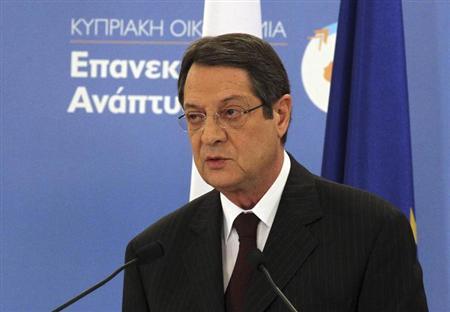
President Nicos Anastasiades has urged eurozone leaders to revise the terms of Cyprus’ bank bailout, in a highly critical letter
But Nicos Anastasiades complained that “no distinction was made between long-term deposits earning high returns and money flowing through current accounts, such as firms’ working capital”.
“This amounted to a significant loss of working capital for businesses.”
The rescue was agreed in March with the troika of international lenders – the European Commission, European Central Bank (ECB) and International Monetary Fund (IMF).
Capital restrictions imposed to prevent a run on Cypriot banks have been eased, but remain in place. The president said such “artificial” measures “will only aggravate the depositors the longer they persist”.
“Rather than creating confidence in the banking system they are eroding it by the day,” Nicos Anastasiades warned.
The text of his letter appeared on the Open Europe think tank’s blog on Wednesday. His complaints about the bailout were also reported by the Financial Times.
Unnamed eurozone officials quoted by Reuters news agency say there are no plans to alter the terms of the bailout for Cyprus or to supply more funds.
Eurozone finance ministers will discuss the letter at a meeting in Luxembourg on Thursday, Reuters reports.
Cyprus has started receiving installments of the bailout package from international creditors.
Cyprus is to ease its citizenship rules for foreign investors who lost at least 3 million euros under the European Union bailout deal.
Cypriot President Nicos Anastasiades said new measures, mostly affecting the Russian business community, would be approved at a cabinet meeting on Monday.
Russians have billions of euros in Cyprus’ bank deposits.
Investors were angered when it emerged they would lose up to 60% of their savings under the terms of the bailout.
In order to secure the 10 billion euros bailout, agreed by the EU and IMF, Cyprus was forced to wind up one major bank and write-off of a large portion of secured debt and uninsured deposits in the largest bank, Bank of Cyprus.
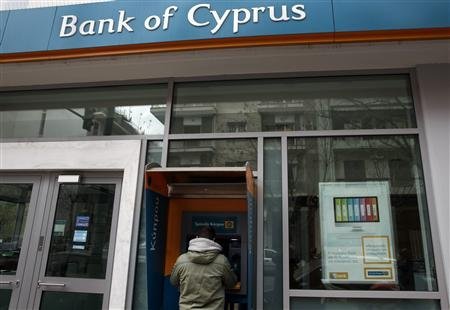
Cyprus is to ease its citizenship rules for foreign investors who lost at least 3 million euros under the EU bailout deal
Speaking at a Russian business conference in the coastal resort of Limassol, Nicos Anastasiades said the new measures would “mitigate to some extent the damage” Russian investors had endured.
Cyprus has been a member of the EU since 2004. The country sealed the EU bailout last month to save it from bankruptcy.
Nicos Anastasiades said foreign investors who held deposits prior to March 15, and who lost at least 3 million euros would be eligible to apply for Cypriot citizenship.
Cyprus’s existing “citizenship by investment” programme will also be revised to reduce the amount of investment required to be eligible from 10 million euros to 3 million.
Nicos Anastasiades said he would also drop requirements for citizenship applicants to keep 15 million euros in Cypriot banks for five years, saying they would be allowed immediate access to their money.
“These decisions will be deployed in a fast-track manner,” he said.
The Cypriot economy is worth about 18 billion euros, which accounts for less than 0.2% of the eurozone total.
Cyprus President Nicos Anastasiades says his country has no intention of the leaving the European single currency.
Nicos Anastasiades said: “In no way will we experiment with the future of our country.”
The president said the financial situation was “contained” following the 10 billion euro bailout deal with the EU and IMF.
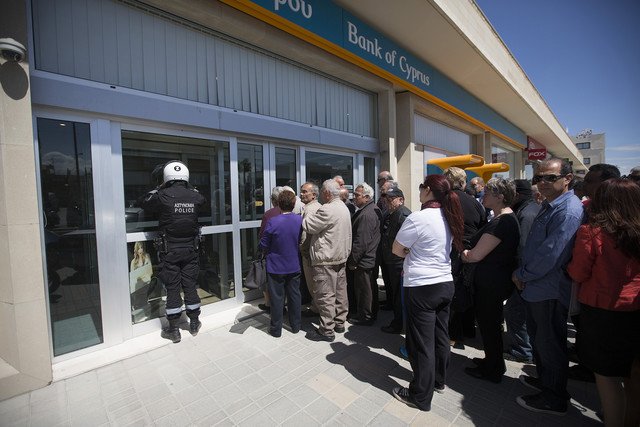
Cypriot banks opened on Thursday, March 28, for the first time in nearly two weeks amid severe new rules imposed as part of the bailout deal
Cypriot banks opened on Thursday, March 28, for the first time in nearly two weeks amid severe new rules imposed as part of the bailout deal.
Queues formed of people trying to access their money, but the mood was generally calm.
By Friday, banks had returned to their normal working hours and there were no longer reports of big queues.
“We have averted the risk of bankruptcy,” Nicos Anastasiades said on Friday.
“The situation, despite the tragedy of it all, is contained.”
The president told a meeting of civil servants: “We have no intention of leaving the euro.”
However, Nicos Anastasiades accused other members of the eurozone of making “unprecedented demands that forced Cyprus to become an experiment”.
Cyprus needs to raise 5.8 billion euros ($7.4 billion) to qualify for the bailout, and has become the first eurozone member country to bring in capital controls to prevent a torrent of money leaving the island and credit institutions collapsing.
As well as a daily withdrawal limit of 300 euros, Cypriots may not cash cheques and those leaving the country will only be allowed to take 1,000 euros with them.
Payments and/or transfers outside Cyprus via debit and or credit cards are allowed up to 5,000 euros per person per month.
Depositors with more than 100,000 euros will see some of their savings exchanged for bank shares.
Foreign Minister Ioannis Kasoulides said on Thursday that such controls could gradually be lifted over the course of the month.
But many economists predict the controls could be in place for much longer.
Cyprus capital controls
- Daily withdrawals limited to 300 euros
- Cashing of cheques banned
- Those travelling abroad can take no more than 1,000 euros out of the country
- Payments and/or transfers outside Cyprus via debit and or credit cards permitted up to 5,000 euros per month
- Businesses able to carry out transactions up to 5,000 euros per day
- Special committee to review commercial transactions between 5,000 and 200,000 euros and approve all those over 200,000 euros on a case-by-case basis
- No termination of fixed-term deposit accounts before maturity
[youtube UYEqW7S5yLw]
The Cypriot banks offered depositors really good rates of interest – as high as 4.75% for long-term accounts – which attracted not only local people, but also hordes of foreigners.
How could the banks afford to pay such great rates? By investing the money from those “savers” in something that itself paid really great rates of interest: Greek government bonds.
When Greece got bailed out, the value of the bonds was cut in half.
But that wasn’t all. The fat interest rate that those bonds were paying was also cut – to just 3.5%.
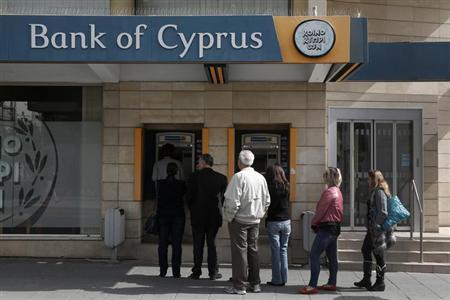
The Cypriot banks offered depositors really good rates of interest which attracted not only local people, but also hordes of foreigners
That meant Cyprus’ banks had a lot less money coming in the door. But they still had to pay their depositors – and in some cases they’re paying depositors more than they’re getting from the bonds.
In other words, the Cypriot banks are deep in debt, and they’re not making enough money to make their interest payments. They’re on the verge of going bust.
For help, the banks turned first to their European neighbors, who agreed to lend them some cash. They’ve now got more money coming in the door, but it’s not enough. Now they need to attack the problem at the other end, by reducing the amount they owe.
Who do they owe money to? The depositors.
Now, some of those depositors are protected – accounts under 100,000 euros are insured.
Cyprus is taking a big chunk of the money in those accounts – around 40%.
The 40% “tax” on those big accounts does two things. First, it brings money into the door of the banks, giving them more money to operate with. Second, it reduces the amount of interest they have to pay to those account holders each month.
Cyprus banks have reopened after a two-week closure sparked by the EU-IMF bailout negotiations, amid tension over possible large scale withdrawals.
Branches were replenished with cash overnight and police and private security guards deployed amid fears of a run on the banks by customers.
Banks customers face strict controls on the amount they can withdraw each day.
The restrictions on the free movement of capital represent a profound breach of an EU principle.
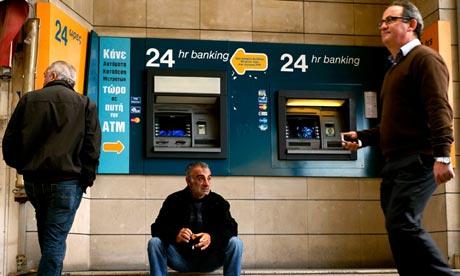
Cyprus banks have reopened after a two-week closure sparked by the EU-IMF bailout negotiations, amid tension over possible large scale withdrawals
However, the European Commission on Thursday justified the move, saying the “stability of financial markets and the banking system in Cyprus constitutes a matter of overriding public interest”.
Cyprus is the first eurozone member country to bring in capital controls.
Cyprus needs to raise 5.8 billion euros to qualify for a 10 billion-euro bailout from the EU, ECB and the IMF, the so-called troika.
As part of the bailout plan, depositors with more than 100,000 euros in Cypriot banks will see their savings taxed in exchange for bank shares.
An earlier plan to tax small depositors was vetoed by the Cypriot parliament last week.
Branches began to open at noon local time and will close at 18:00.
Some armed police have been deployed and hundreds of staff from the private security firm G4S are guarding bank branches and helping to transport money.
The stock exchange, shut since March 16, remains closed on Thursday and will not reopen until after Catholic Easter.
In a statement issued on Wednesday, the ministry of finance insisted the capital control measures were temporary and were needed to “safeguard the stability of the system”.
It read: “The Central Bank of Cyprus and the government of Cyprus will review them each day, with a view to progressive lifting of the measures as soon as circumstances allow.”
The severe new rules have been imposed to prevent a torrent of money leaving the island and credit institutions collapsing.
As well as the daily withdrawal limit, Cypriots may not cash cheques.
Payments and/or transfers outside Cyprus via debit and or credit cards are allowed up to 5,000 euros per person per month.
Transactions of 5,000-200,000 euros will be reviewed by a specially established committee, with applications for those over 200,000 euros needing individual approval.
Travellers leaving the country will only be allowed to take 1,000 euros with them.
On Wednesday night, hundreds of protesters rallied outside the presidential palace, chanting: “I’ll pay nothing; I owe nothing,” the Reuters news agency reported.
Many economists predict the controls could be in place for months.
The unprecedented restrictions represent a profound breach of an important principle of the EU that capital, as well as people and trade, should able be to move freely across internal borders.
However, the European Commission said member states could introduce capital controls “in certain circumstances and under strict conditions on grounds of public policy or public security”.
But it added that “the free movement of capital should be reinstated as soon as possible”.
[youtube 36BMKHeDtLo]
[youtube FMLTpVUZH44]
Cypriot Finance Minister Michalis Sarris has confirmed that the depositors with less than 100,000 euros in their accounts “will not be hit”.
People with more than 100,000 euros in their accounts could see about 40% of their deposits converted into bank shares, Michalis Sarris said.
“The exact percentage is not… yet decided but it is going to be significant,” he said.
The final figure will depend on how the government decides to protect pensions.
The finance minister confirmed that all Cypriot banks will remain closed until Thursday and that capital controls will be placed on the size and the amount of money people will be allowed to withdraw once they have reopened.
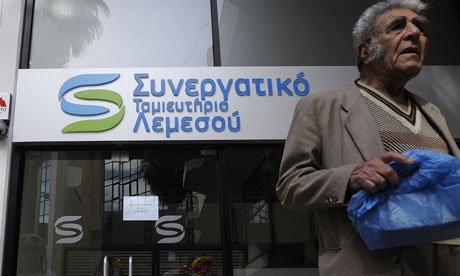
Cyprus bank deposits over 100,000 euros could be cut by 40 percent
These restrictions would “probably be a bit stricter” on the country’s two largest banks, Bank of Cyprus and Laiki, and would remain in place until the banking system “stabilizes”, Michalis Sarris said.
The exact details of this “two tier system” would be hammered out with the banks later on Tuesday, he said.
Michalis Sarris is expecting “some bleeding, some outflow” of funds once the banks reopen, but believes that once EU bailout funds begin flowing “in a matter of weeks”, confidence will return.
Although the economy would be badly hit by the economic crisis, Michalis Sarris admitted, he maintained that it could benefit from “an energy boom”, referring to the exploratory Aphrodite gas fields off the southern coast of the island.
“Yes, there will be a problem but we will overcome it in a relatively short period of time,” he said. He also said his government had renegotiated more favorable loans terms with Russia.
The Cypriot authorities had said all but the biggest two banks would open on Tuesday.
Banks have not been open since March 15. Their reopening had been expected after Cyprus agreed a deal with the IMF and the EU that releases 10 billion euros in support.
It was conditional on Cyprus itself raising 5.8 billion euros, most of which looks likely to come from depositors with more than 100,000 euros in Bank of Cyprus and Laiki or Popular Bank.
The banks remained closed after the country’s first money-raising solution, which would have hit smaller deposit holders as well as larger holdings, was rejected by parliament.
The new deal for Cyprus, unlike previous agreements, does not require parliamentary approval. It will also include austerity measures and tax increases.
Laiki will be shut down, and deposits under 100,000 euros, which are guaranteed by the state under EU law, will move into the Bank of Cyprus to create a “good bank”.
Deposits above that insured amount will be frozen and used to pay Laiki’s debts and recapitalize the Bank of Cyprus, with depositor losses eventually converted into shares.
Major depositors, many of whom are wealthy Russians, will not be able to access accounts exceeding the 100,000-euro limit until the restructuring of the banks is complete.
Cypriot President Nicos Anastasiades says he is battling against eurozone demands that all bank customers pay a one-off levy in return for a bailout.
Nicos Anastasiades said he shared people’s unhappiness with the terms, whereby all bank customers would pay a levy of 6.75% or 10% on their bank deposits.
The EU and IMF have demanded the levy in return for a 10 billion-euro ($13 billion) bank bailout.
An emergency session of parliament has been postponed until Monday.
Nicos Anastasiades said it was the worst crisis since Turkey invaded in 1974.
“I fully share the unhappiness caused by a difficult and painful decision,” he said.
“That’s why I continue to fight with the eurogroup to amend their decisions in the coming hours to limit the impact on small depositors.”
The president said Cyprus had had to choose between stabilizing its finances or the eventual collapse of its financial system and exit from the eurozone.
Under the bailout’s terms, people in Cyprus with less than 100,000 euros in their accounts would have to pay a one-time tax of 6.75%. Those with sums over that threshold would pay 9.9% in tax.
Depositors will be compensated with the equivalent amount in shares in their banks, and Nicos Anastasiades promised that those who kept deposits in Cypriot banks for the next two years would be given bonds linked to revenues from natural gas.
Cyprus announced the discovery of a field containing between 5 and 8 trillion cubic feet of natural gas under the Mediterranean Sea in 2011 but Turkey disputes its drilling rights.
It is believed that eurozone leaders, particularly in Germany, insisted on the levy because of the large amount of Russian capital kept in Cypriot banks, amid fears of money-laundering.
The speaker of the European Parliament, Germany’s Martin Schulz, has called for the levy to be revised to protect small-scale bank customers.
It is now clear that negotiators of the bailout in Brussels drastically underestimated the reaction in Cyprus.
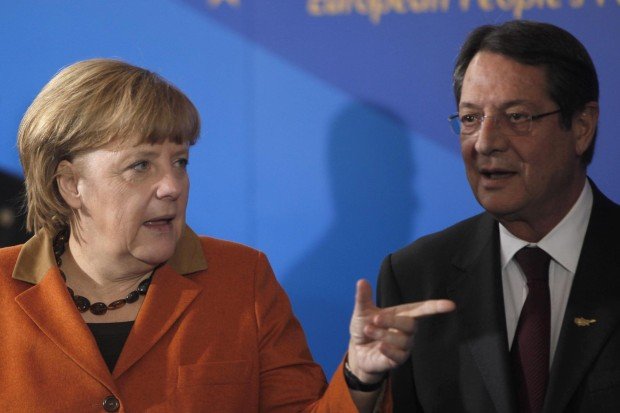
Cypriot President Nicos Anastasiades says he is battling against eurozone demands that all bank customers pay a one-off levy in return for a bailout
A tiny eurozone economy feels it is being blackmailed by the most powerful, and the growing resentment will do nothing to foster European solidarity.The solution we concluded is not what we wanted but is the least painful under the circumstances,” President Nicos Anastasiades said on TV.
“I bear the political cost for this, in order to limit as much as possible the consequences for the economy and for our fellow Cypriots.”
The vote in parliament has been postponed to Monday afternoon. If the deal is defeated, state media say banks could be closed on Tuesday so as to avoid mass withdrawals.
The Cypriot president’s Democratic Rally party – which has 20 seats in the 56-member assembly – needs support from other factions to ratify the bailout.
Opposition leader George Lillikas, an independent, said the president had “betrayed the people’s vote”.
The speaker of the European Parliament, Martin Schulz, argued in a newspaper interview that there should be an exemption from the levy for savers, for example, who had less than 25,000 euros in their accounts.
“The solution must be socially acceptable,” Martin Schulz, who belongs to Germany’s opposition Social Democrats, told Germany’s Welt am Sonntag newspaper.
The German Chancellor, Angela Merkel, defended the levy, saying: “I think it’s a good step which will certainly make it easier for us to approve the help for Cyprus.”
As with past eurozone bailouts, the deal must be approved by the lower house of parliament in Germany, the EU’s biggest economy.
If the levy goes ahead, it will affect many non-Cypriots with bank accounts.
However, depositors in the overseas arms of Cypriot banks will not be hit.
The levy itself will not take effect until Tuesday, following a public holiday, but action is being taken to control electronic money transfers over the weekend.
[youtube e0BiExlxW4k]
Spain’s borrowing costs have risen to another euro-era record, with lenders demanding a higher interest rate.
The yield on benchmark 10-year bonds hit 7% on Thursday morning, a level which many analysts believe is unsustainable in the long term.
It came as Moody’s cut Spain’s credit rating to one notch above “junk” and ahead of an Italian bond auction.
At the weekend, Spain agreed a 100 billion-euro ($126 billion) bailout of its banks by fellow eurozone countries.
It was hoped that the bailout would help calm fears in the financial markets about the strength of Spain’s banks and ease Madrid’s borrowing costs.
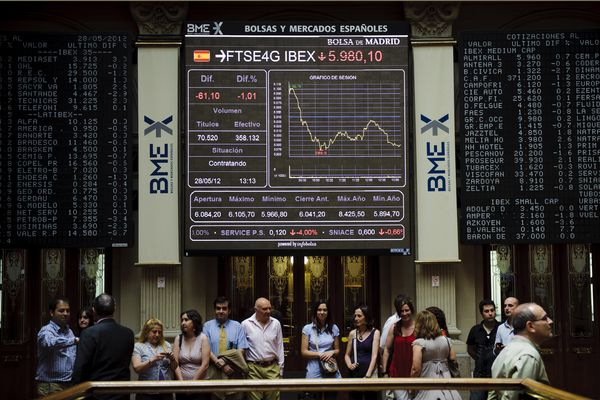
Spain's borrowing costs have risen to another euro-era record, with lenders demanding a higher interest rate
However, Moody’s said the eurozone plan to help Spain’s banks would increase the country’s debt burden.
Moody’s cut Spain’s rating from A3 to Baa3 and said it could reduce this further within the next three months.
If Spain is cut to junk, some index-tracking investors would be forced to sell the country’s bonds. This would add to upward pressure on yields and push Spain’s financing costs higher, heightening the risk that the country will need a full-blown bailout.
The difference in the rate between Spanish and safe-haven German 10-year bonds widened to a high of 5.44 percentage points.
“The risk of losing investment grade pressured the differential this morning and left it at historic highs,” analysts at Spanish brokerage Renta 4 said in a market report.
Italy will test market sentiment on Thursday with the sale of up to 4.5 billion Euros of bonds.
On Wednesday, Moody’s also cut its credit rating for Cyprus by two notches, from Ba1 to Ba3. Cypriot banks are heavily exposed to the troubled Greek banking system.
However, it is unclear whether the Cypriot government will seek a loan from its European partners or will instead turn to Russia, who already provided it with a 2.5 billion-euro loan in December.








